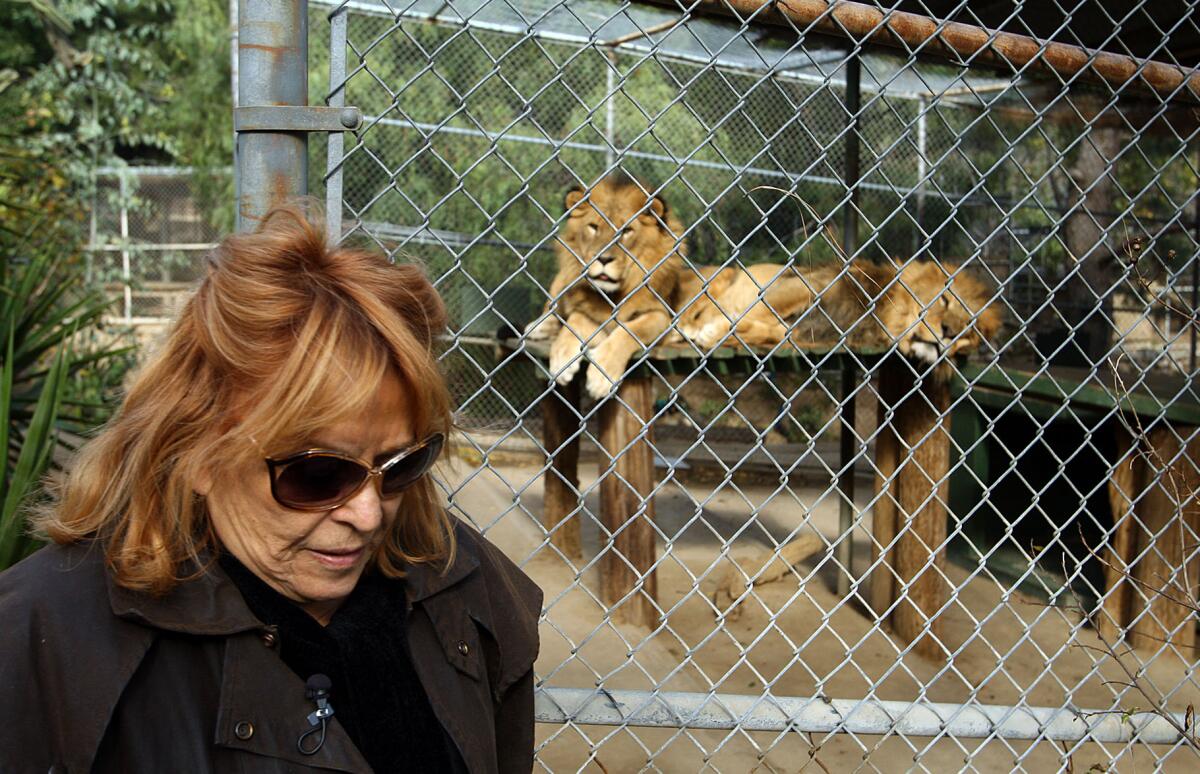What of the lions, tigers and owls? Wildlife Waystation in Angeles forest is closing

- Share via
State officials on Tuesday said the long-struggling Wildlife Waystation in the Angeles National Forest is shutting down for good, and the center is collaborating with the California Department of Fish and Wildlife to relocate more than 470 exotic animals including lions, tigers, alligators, wolves, owls and 42 chimpanzees.
On Aug. 11, the board of directors of the 43-year-old animal sanctuary voted to shutter the facility, surrender its CDFW permits and assist in finding new homes for its creatures with local and national animal welfare organizations across the nation, said Jordan Traverso, a spokeswoman for the agency.
“Some animals will be moving out as early as tomorrow,” Traverso said Tuesday, “but it’s going to be a long process because there are so many, and some of them are old and in primary care.”
Deanna Armbruster, a spokeswoman for the 160-acre Wildlife Waystation, was unavailable for comment. But Traverso said the facility, located just outside Los Angeles city limits, suffered extensive damage in the 2017 Creek fire near Tujunga, followed by severe flooding earlier this year.
“Wildlife Waystation leadership is unable to repair the facility to current standards,” she said.
For two decades, federal, state and Los Angeles County animal welfare authorities have been scrutinizing the waystation, one of the largest of its kind, for alleged environmental and animal-safety violations.
At the center of the crisis is Martine Colette, the waystation’s founder, who resigned in May as president and chief operating officer.
The executive shakeup was followed by a terse statement by the waystation, suggesting that the facility’s troubles extended beyond the care and housing of injured and abandoned exotic animals.
“The Board is conducting a comprehensive review of the fiscal and other impacts of non-approved and non-authorized activities and transactions by staff,” the board of directors said in a statement. It added that staff were “planning and executing activities unbeknownst and unauthorized” to the board, a claim that could not be immediately verified.
Over the years, Colette, a dedicated animal welfare advocate, charmed Hollywood celebrities such as Bruce Willis, Will Smith and Drew Barrymore into opening their wallets for her cause. For years, the waystation filled a need by taking in animals abandoned from private collections and roadside attractions, such as lions and tigers, as well as many other injured and orphaned animals, and housing them until they found a home.
Yet even some of Colette’s supporters described her as occasionally abrasive, with a fierce love of animals and a disdain for any rules but her own.
Colette, 76, the French-born daughter of a Belgian diplomat, lived most of her childhood in Nairobi, Kenya. As a teenager, she worked in trapping camps, where lions and other animals were taken before being shipped to zoos abroad.
Colette moved to Los Angeles with her then-husband, whom she described as a “famous American writer,” and became plugged into the Hollywood scene.
A mountain lion in a 5-by-5 cage drew her pity at a 1965 show at the Pan-Pacific Auditorium and became her first refugee. Within 10 years, she had accumulated a house full of beasts and a yard full of wild cats, spurring her move to Little Tujunga Canyon and the opening of the Wildlife Waystation.
Authorities closed the facility to the public in 2001 and barred it from taking in additional sick, injured or abandoned animals. A year later, the U.S. Department of Agriculture suspended operations after inspections revealed that the waystation had not fixed long-standing crowded, unsanitary and unsafe conditions.
The waystation’s license was reinstated after it spent $2 million to bring habitation for animals into compliance. Repairs included improved cages, a new perimeter fence, upgraded kitchen and hospital facilities, and diversion of animal waste from waterways into a sanitary drain system.
At that time, the annual food, medical and cleaning bill for the waystation was roughly $3 million annually. Several times that amount would be needed to bring the facility into full compliance with county, state and federal regulations, state officials said.
Now, “the CDFW’s primary concern is for the health and welfare of the animals at the waystation,” Traverso said. “The property is closed until further notice and access will not be granted.
“We plan to stay at the facility,” she added, “until new homes are found elsewhere for all the animals. We’re not sure at this point, if that will include refuges in other countries.”
More to Read
Sign up for Essential California
The most important California stories and recommendations in your inbox every morning.
You may occasionally receive promotional content from the Los Angeles Times.











